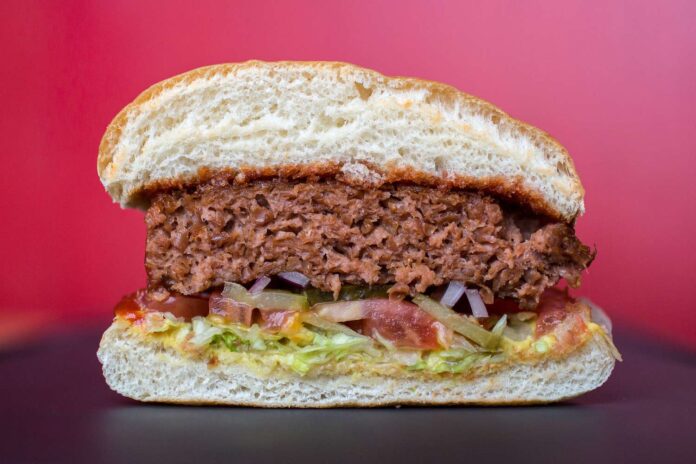:max_bytes(150000):strip_icc():format(jpeg)/When-Plant-Based-Foods-Arent-As-Healthy-As-You-Think-They-Are-FT-BLOG0824-acbc49db11b24fec831f756da5e5e8c2.jpg)
For years, public health officials have stressed the importance of following a largely plant-forward diet to lower one’s risk of developing a range of serious diseases. But not all plant-based foods are created equal, leading to plenty of confusion about what you should — and shouldn’t — reach for at the grocery store.
Now, new research suggests that opting for ultra-processed plant-based foods can raise your risk of experiencing serious health events like heart attacks and strokes. The study, published in The Lancet Regional Health – Europe, analyzed nearly a decade’s worth of data from about 118,000 adults who participated in the UK Biobank, a long-term study of health and lifestyle in the UK. Overall, the researchers discovered that the more ultra-processed foods people ate, the higher the odds they would die from heart disease.
Specifically, for every 10% increase in calories from plant-based ultra-processed foods, people had a 5% higher risk of developing heart disease and a 6% higher risk of coronary heart disease.
But it wasn’t all bad news for plant-based products. For every 10% increase in whole plant-based foods, people had an 8% lower risk of developing coronary heart disease and a 20% lower risk of dying from the condition. These people also had a 13% lower risk of dying from any cardiovascular disease.
“Many high-quality research studies have shown that eating more ultra-processed foods is linked to poor health outcomes, including obesity, type 2 diabetes, heart disease, and cancer, and our new study adds important evidence that plant-based ultra-processed foods do not offer the same protection as the fresh and minimally processed plant-based foods such as fruit and vegetables, whole grains, and legumes,” says study co-author Kiara Chang, a research fellow at Imperial College London. Chang stresses that “it is important that we are aware of the health risks and to cut down on ultra-processed food intake as much as possible.”
Of course, this is a complicated space, given that labels on these foods and advertisements can be confusing. Here’s how to wade through it all.
Ultra-processed vs. processed foods
There is a lot of confusion around levels of food processing, which is classified on something known as the NOVA scale.
Processed foods are foods that are altered from their natural state, per the NOVA scale. These usually have ingredients like oil, salt, and sugar added to them. “It means the food has undergone some kind of processing to make it edible or to get it in the form in which you’re consuming it,” says Jessica Cording, RD, author of The Little Book of Game-Changers: 50 Healthy Habits For Managing Stress & Anxiety. Rolled oats are processed, for example, and so are frozen berries and canned beans.
For every 10% increase in calories from plant-based ultra-processed foods, people had a 5% higher risk of developing heart disease and a 6% higher risk of coronary heart disease.
This differs from unprocessed and minimally processed foods, which are in their natural state or barely altered, per the NOVA scale. (Those include things like milk and fresh produce.)
However, ultra-processed foods are made with additional ingredients like artificial colors and flavors, preservatives, and other ingredients designed to preserve the food’s texture and make it last longer. “Ultra-processed foods cannot be made in our domestic kitchen,” Chang explains. “They are produced through a series of complex industrial processing steps, which includes breaking down a few foods into substances such as fat, protein, carbohydrate, and often chemically modified them before recombining them together to make the final product.”
Which plant-based foods are ultra-processed?
Certain ingredients tend to repeatedly show up in ultra-processed foods. “When scanning a label, look for ingredients such as high-fructose corn syrup, hydrogenated oils, artificial flavors, emulsifiers, preservatives, and other additives that are not typical in home cooking,” says Scott Keatley, RD, co-founder of Keatley Medical Nutrition Therapy. “Individually, these ingredients should not disqualify a food, but having multiple of these in one food is a red flag that the product is ultra-processed.”
In the plant-based category, snacks and convenience foods tend to be the most likely to be ultra-processed, Keatley says. But many plant-based burgers, sausages, nuggets, and protein bars are also problematic, per Cording. Chang also flags dairy-free plant-based yogurts as an issue, given that many “contain all sorts of additives, making them ultra-processed.”
Why are ultra-processed foods bad?
At baseline, ultra-processed foods usually have vital nutrients taken away. “Ultra-processing often involves refining raw ingredients and adding various substances to create a final product,” Keatley says. “This process can strip away beneficial nutrients like fiber, vitamins, and minerals found in whole foods.”
Ultra-processed foods “don’t offer much nutritional value” and can crowd out more nutrient-dense whole foods, Cording says.
Ultra-processed foods have also been linked to a higher risk of serious health issues, including chronic diseases and cancer. A recent study also found that people who ate higher amounts of ultra-processed foods were 10% more likely to die from any cause compared to those who ate minimally processed foods.
Some of these ultra-processed foods are marketed to children, which Cording says is especially concerning given that proper nutrients are important for health and even intelligence as kids grow.
Overall, experts recommend doing your best to focus on eating whole, minimally processed foods. “Aim to fill your diet with fresh fruits, vegetables, whole grains, nuts, seeds, fish, shellfish, lean cuts of beef, pork, and poultry and legumes,” Keatley says. “Pair any ultra-processed foods with fruit and veggies, even if they are plant-based.”
Cording stresses that “there are some really great plant-based products out there.” However, she adds, “Just because something is plant-based does not necessarily mean that it’s healthy.”



